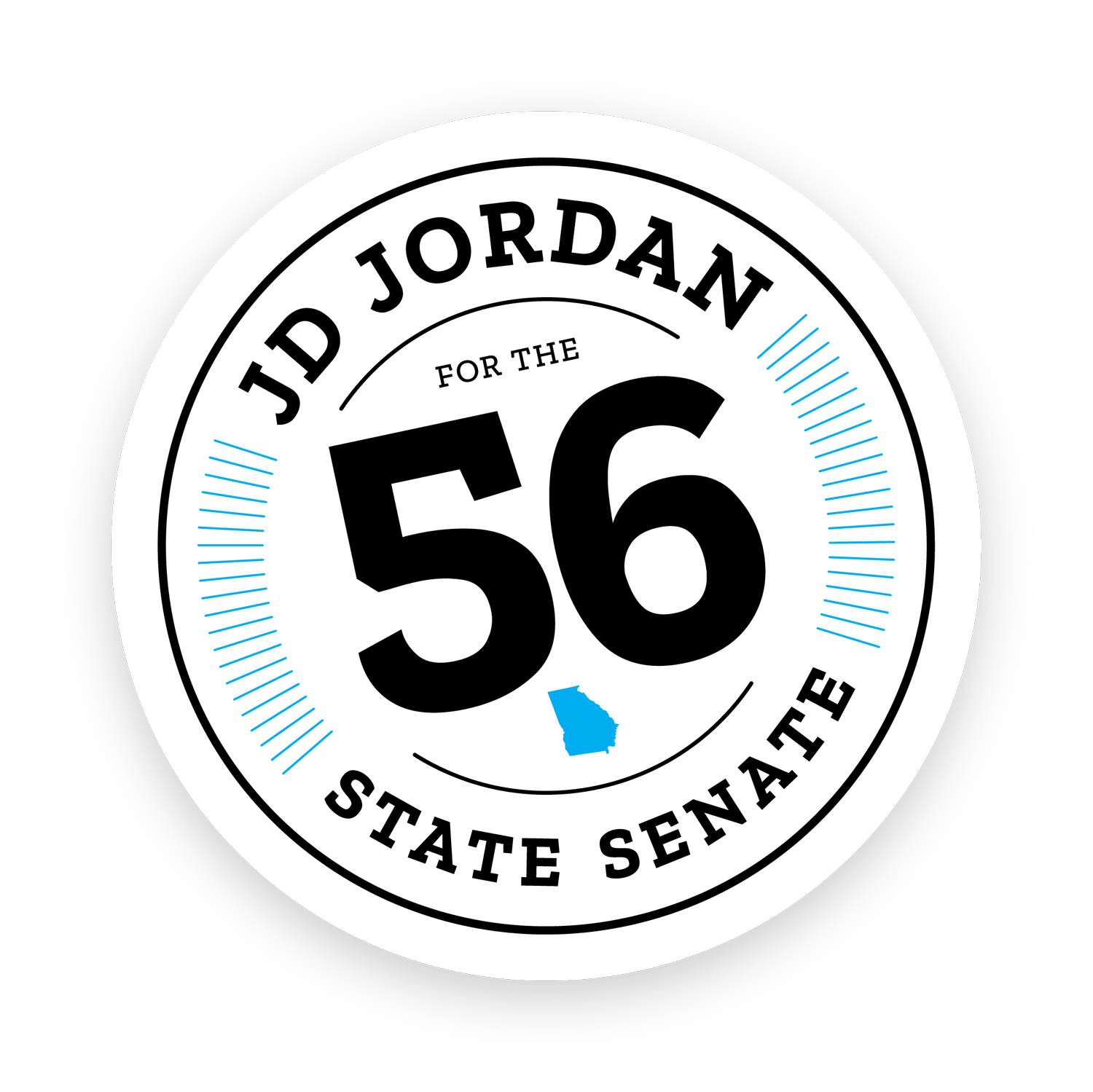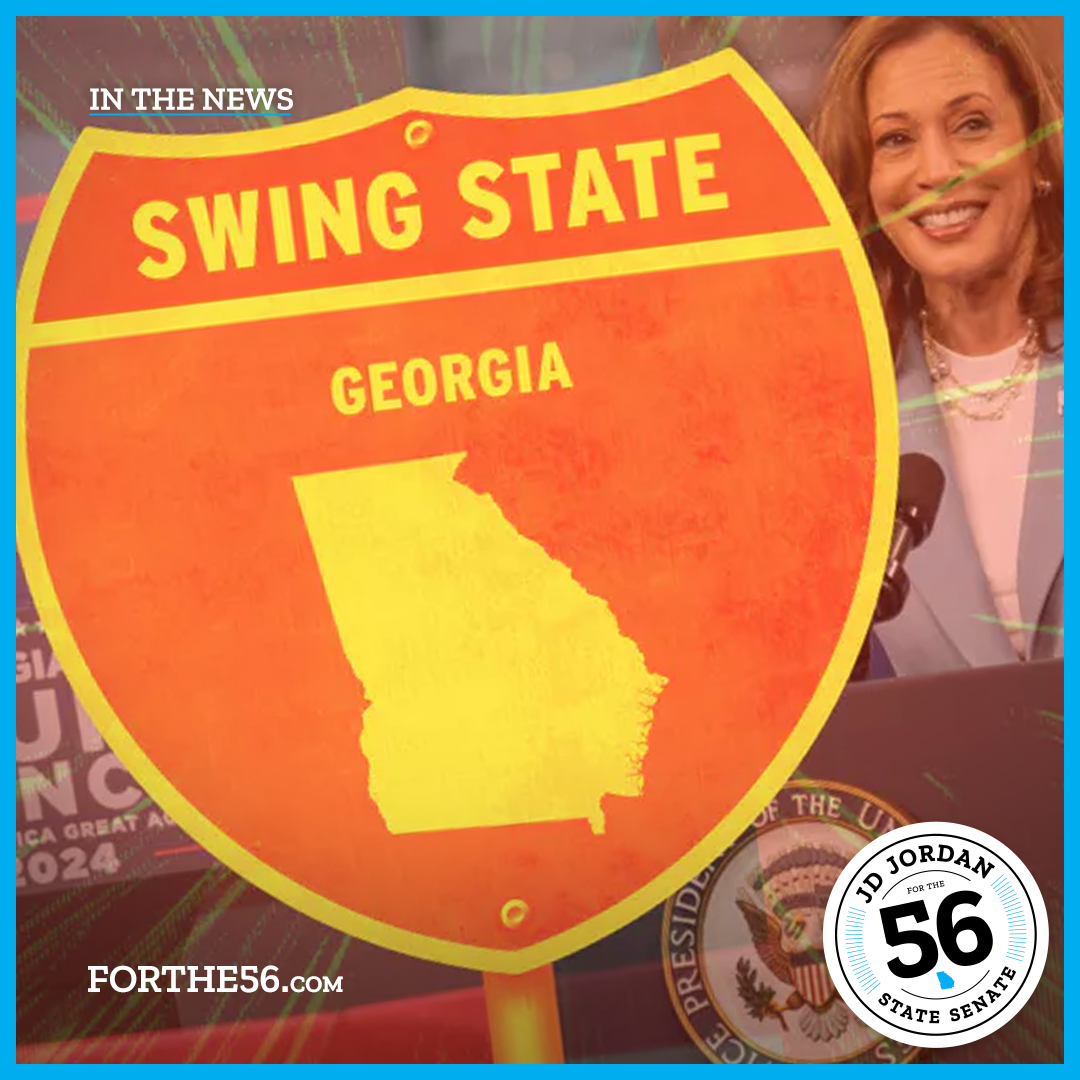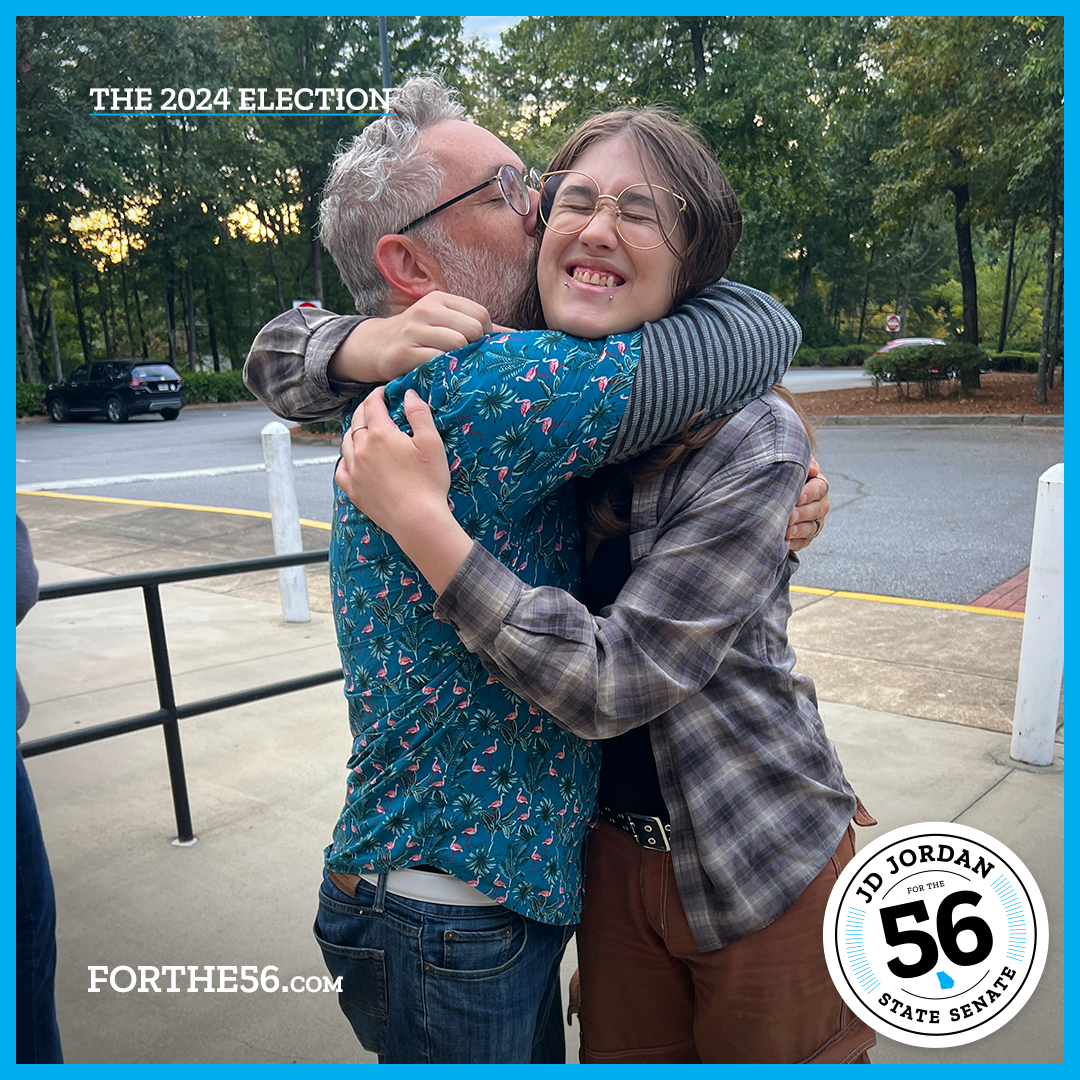Georgia could swing away from a GOP trifecta.
Could Georgia decide the fate of the 2024 presidential election? Photos: Richard Burkhart/Savannah Morning News / USA Today Network, Phil Mistry / Shutterstock
These LGBTQ+ people are making that happen.
The following article originally appeared in LGBTQ Nation on October 16, 2024.
In a state like Georgia that has a Republican trifecta—a Republican governor and a party majority in both chambers of the state legislature—queer community leaders and political strategists are working diligently to prove Atlanta isn’t the state’s only allegedly progressive community.
Georgia has roughly 8 million registered (active and inactive) voters. Georgia’s Secretary of State online data hub indicates there have been 121,898 more active voters since the December 2022 runoff election, and each one will count in a battleground state that could determine the nation’s future.
In September, the Georgia State Election Board voted to have all cast ballots counted by hand. Many consider this rule change an ongoing effort to undermine or at least delay election results. Democrats, who were once pushing Gov. Brian Kemp (R) to hold an ethics hearing, filed a lawsuit to have a judge push Kemp to remove some of the members of the elections board believed to be former President Donald Trump loyalists. While one judge dismissed the case in early October, a Fulton County Superior Court Judge issued an injunction blocking the hand count rule on the first day of early voting in the state. The judge felt the new rule was approved too close to Election Day and would create “administrative chaos.”
Georgia’s narrative as a battleground state has been a major talking point in recent years. According to some reports, Stacey Abrams’ 2018 gubernatorial campaign was a test case to prove if the Democratic party mounted a “sustained voter outreach campaign,” the state could flip from red to blue. In Georgia, Joe Biden narrowly beat Trump by 11,779 votes during the 2020 election, garnering him the Electoral College votes needed to become the 46th president of the United States and strengthening the argument that Georgia could be a viable player on the national stage. Two years later, Sen. Raphael Warnock’s runoff win over Republican challenger Herschel Walker solidified the state’s status as a bonafide swing state.
How has this happened? An increasing number of LGBTQ+ community leaders and political strategists have worked tirelessly to galvanize voters of all ages, backgrounds, and identities to build a coalition beyond the state’s capital, Atlanta. They have also proven, to some extent, that they carry political power in the state and have built effective grassroots efforts in their local communities.
Georgians are fighting for people over politics.
FTR Political Strategies co-founder Mo Pippin.
At 28, Mo Pippin (they/them) is one Georgian hoping to turn the state from purple to blue. In 2023, they co-founded FTR Political Strategies out of a need for greater engagement in local elections and voter education.
“Here in Roswell — which is just a hop, skip, and a jump away from Athens — we’re doing the work to boil down these large, sometimes scary federal issues to local and state issues that are digestible, recognizable, and salient to people; and trying to connect them with better representatives,” Pippin told LGBTQ Nation. “I believe fully that young people have been primed to have conversations with people who are different from us. One of the primary things that we do to engage voters is we canvas; we knock on doors.”
Pippin said voters have warned them to be careful in their neighborhood whenever they canvass in traditionally conservative areas of Roswell. They believe the warning is rooted in an assumption that other residents in the region will not be welcoming and potentially combative.
“If I’m looking at our state government and I don’t see people who look like me or who act like me or who share the same values as I do, it’s an easy assumption that, because of what we’re told about democracy, these people who got into office through the means of popular vote naturally represent our entire population,” they said. “But that’s not the case. Our voter turnout in the state is incredibly low. The system is made that way. There are all of these structural reasons – getting their children to school, getting to work themselves, making sure their families are fed, and their health needs are met – why people are not able to engage in the [political process] in our state. People are too tired and too busy to vote.”
Organizations like Georgia Equality, the state’s largest and oldest LGBTQ+-centered advocacy organization, are actively working to engage, educate, and advocate. This past year, it played an integral role in helping defeat the nearly 20 anti-LGBTQ+ bills introduced in the state legislature by appearing regularly at the state Capitol for hearings, votes, and meetings alongside other pro-LGBTQ+ groups. The organization also leveraged the community, organizing more than 5,000 people to make calls to their representatives during the session.
“Our priority is not to leave any LGBTQ+ Georgian behind,” Noël Heatherland (they/them), statewide organizing manager for Georgia Equality, told LGBTQ Nation. “And making sure that everyone, especially those who do not live inside the bubble of the city of Atlanta, is remembered and included throughout the year, especially during a time where our civic engagement and letting our voices be heard is so important.”
The queer experience in the state’s southern region comes with its own set of issues and specific concerns, said Heatherland, a native of Albany, Georgia. While recent reports suggest that most LGBTQ+ voters are motivated to support the Democratic party and concerned about issues like restricting women’s rights and banning medical care for transgender youth, Heatherland said queer Georgians are also concerned with a lot of the same issues that impact people across various communities and demographics.
Omarion Smart agrees. A senior at Georgia State University, Smart is a native of Bainbridge, Georgia, in the southwest region. He’s also policy director for Voters of Tomorrow, a social welfare organization for Gez Z, by Gen Z. Housing, food security, and the cost of living are key issues queer voters are taking to the ballot box this November, he said. Healtherland adds queer voters in the state are also concerned about quality education for their children and the safety of their children in schools. According to the Williams Institute at the UCLA School of Law, the LGBTQ+ population makes up about 4.7% of the population in the state of Georgia, with 27% of them having children.
“The majority of Georgians agree on these things,” Smart said. “We agree that housing should be affordable. We agree that we should have health care and that Medicare and Medicaid should be expanded. The economy. Housing. As well as the rise of transgender hate ideology and reproductive rights. They are all important issues to voters in Georgia. No one issue has priority over the other. Yet we have those in the legislature that do not reflect the population of our state, and it’s time that we change that.”
Smart’s concerns manifested this August when Georgia Lt. Gov. Burt Jones (R) launched the Georgia Senate Special Committee on the Protection of Women’s Sports “to ensure that female athletes across Georgia have the right to compete on a fair and level playing field.” Smart believes the committee and its purpose are “disgusting.”
“It’s not even intended to learn about these issues,” Smart said. “That’s just how the politics in our state are. Their goal is to spew their blatant hate and not be called out on their hatred.”
As far as Shawn Harris is concerned, the energy behind anti-LGBTQ+ and transgender legislation by the conservative party is a smokescreen. Harris is challenging Rep. Marjorie Taylor Greene (R-GA) for Georgia’s 14th congressional district, which includes Rome, Calhoun, and Dalton in the northwest. He said that Greene has created a narrative about the region that makes it seem problematic. Harris, however, says local voters are more focused on quality of life, including jobs and affordable housing.
“People get up every day from our area and drive either to Atlanta to go to work or they drive to Chattanooga, Tennessee. They get up every morning at 4 a.m. to beat the traffic,” Harris told LGBTQ Nation. “They’re not home when it’s time for their kids to get off from school. They’re not home for their kid’s soccer games or whatever. They do this for a good-paying job with insurance. And they need affordable housing.”
As election day gets closer, queer voters in Georgia have an impressive slate of candidates to consider: Gen Z Democrat Ashwin Ramaswamy is running for state Senate District 48, challenging Trump loyalist Shawn Still, who was indicted in the Fulton County election interference case last year; RaShaun Kemp won the Democratic primary to fill state Senate seat District 38 and is reportedly the first openly gay man elected to the state Senate; and Laura Judge is running for the County School Board, Post 5.
“The Cobb County school system has been implementing a ton of book bans against a variety of different books and also enacting discriminatory policies,” said strategist Pippin. “If she wins, control of the Cobb Board of Education would flip and stop the madness happening there. Her district is extremely competitive, and I’m cheering for her big time.”
One candidate with personal stakes is JD Jordan, running against John Albers for Georgia Senate District 56.
“He is running to protect his children from harmful state policies. The incumbent is a co-sponsor of anti-trans legislation that threatens healthcare access for JD’s children,” said Pippin. “He has five kids between the ages of 14 and 19, and two of them identify as transgender.”
Georgia Equality’s Heatherland said Albers is not cordial to LGBTQ+ people or allies and is not willing to listen to them when they are at the Capitol to discuss issues – even if they are his constituents. The district is now trending as one of the state’s most “flippable” districts.
“It’s one thing to speak up on behalf of LGBTQ+ children, and specifically transgender people, when you’re running for something in Atlanta and like 85% of the people you’re talking to agree with you,” added Pippin. “It’s another to do that in a district that is red like SD56, and JD is out here fighting that fight and helping dispel all the misinformation that is spewed about the queer community. He is the dad many of us in the community wish we had growing up.”
JD JORDAN FOR GEORGIA STATE SENATE DISTRICT 56
For anyone in East Cobb, Roswell, or Woodstock alarmed by the state’s escalating attacks on our bodies, our families, our doctors’ offices, our classrooms and libraries, even our polling places, I’m running for State Senate district 56 to fight for our freedoms and to deliver a better future for everyone in Georgia.
And unlike my opponent who’s spent 14 years rolling back our freedoms, failing to safeguard our kids, and gerrymandered his district to stay in office, I promise to bring everyone in the 56—regardless of ideology—the best possible constituent experience so you feel heard, valued, and supported. As we all deserve to be.
I’m running for the 56. Let’s make a better Georgia for all of us.
—
FOR MORE INFORMATION, CONTACT
Jordan For Georgia, LLC
10800 Alpharetta Hwy Ste 208 #629
Roswell, GA 30076-1467
jdjordan@forthe56.com
706.804.0456



